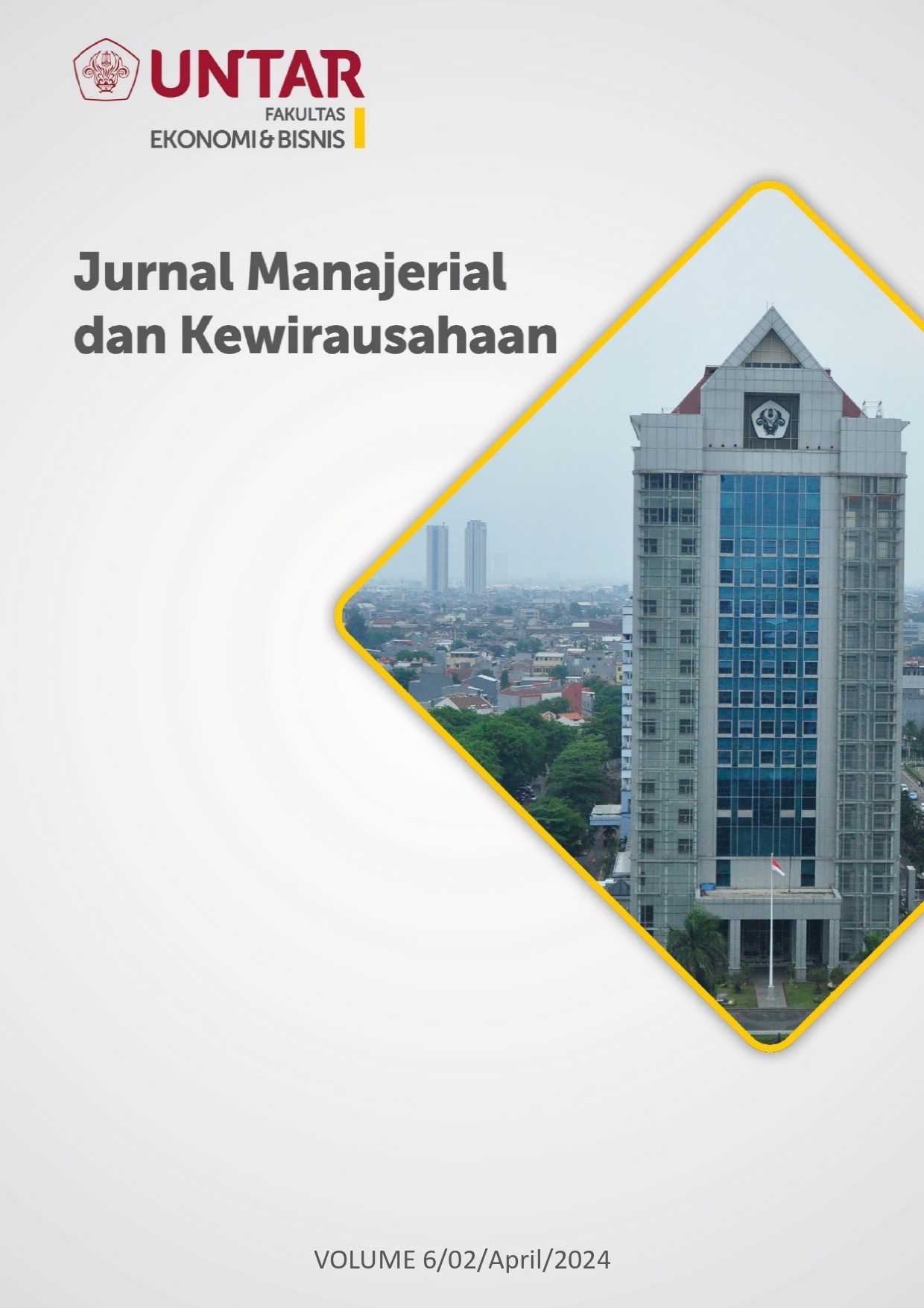Faktor yang Mempengaruhi Repurchase Intention dalam Berbelanja Online di Aplikasi Bukalapak
Main Article Content
Abstract
The increase in Indonesia's economic growth is influenced by the industrial revolution 4.0. The industrial revolution 4.0 creates digital transformation, one of which is the development of online business systems. With digital transformation, it can open up opportunities to improve Indonesia's digital economy. This is proven in 2022 that Indonesia's digital economy figures will increase by 22% compared to the previous year. One of the biggest contributing sectors to the growth of Indonesia's digital economy is e-commerce. Bukalapak is one of the largest e- commerce companies in Indonesia. This research aims to determine the influence of e-Trust, e-WOM, and perceived value on repurchase intention on the Bukapalak application in Jakarta. This research used a purposive sampling method with a total of 208 respondents via an online questionnaire in the form of Google form. Data obtained through questionnaires were analyzed using the PLS-SEM method and using SmartPLS 4.0 software. The results of this research show that (1) e-Trust has a positive and significant influence on repurchase intention among Bukalapak application users in Jakarta. (2) e-WOM has a positive and significant influence on repurchase intention among Bukalapak application users in Jakarta. (3) perceived value does not have a positive and significant influence on repurchase intention among Bukalapak application users inJakarta.
Article Details
Section

This work is licensed under a Creative Commons Attribution-NonCommercial-ShareAlike 4.0 International License.
This work is licensed under a Jurnal Muara Ilmu Ekonomi dan Bisnis Creative Commons Attribution-ShareAlike 4.0 International License.,/p>
References
Amalia, S., Hurriyati, R., & Dirgantari, P. D. (2023). Dampak Electronic Word of Mouth dan Percieved Value dalam Meningkatkan Online Repurchase Intention pada Platform Tokopedia. Coopetition : Jurnal Ilmiah Manajemen, 14(3), 619–636. https://doi.org/10.32670/coopetition.v14i3.2686
Aurelia, F. & Nawawi, M. T. (2021). Pengaruh Customer Satisfaction, Perceived Value, dan Trust terhadap Online Repurchase Intention pada Fashion di Instagram di Jakarta. Jurnal Manajerial dan Kewirausahaan, 3(1), 117-126. https://doi.org/10.24912/jmk.v3i1.11296
Indrawati, L. & Nurjanah, L. (2023). Analysis of Factors Affecting Repurchase Intention in Mobile Shoppping Apllications on Generation Y. Management Studies and Entrepreneurship Journal, 4(4), 3718-3734.
Iskandar, I. & Bernarto, I. (2021). The Influence of Website Design Quality, Perceived Value, and E-Trust on Repurchase Intention on E-Commerce Beauty Haul. International Journal of Economics, Business and Accounting Research (IJEBAR), Vol. 5, No. 4, pp. 1167– 1177. https://jurnal.stie-aas.ac.id/index.php/IJEBAR
Jusuf Zeqiri, Veland Ramadani & Wassim J. Aloulou (2023) The effect of perceived convenience and perceived value on intention to repurchase in online shopping: the mediating effect of e-WOM and trust. Economic Research-Ekonomska Instraživanja, 36:3, https://doi.org/10.1080/1331677X.2022.2153721
Martínez, P., & Rodríguez, I. (2013). CSR dan Loyalitas Pelanggan: Peran Kepercayaan, Identifikasi Pelanggan dengan Perusahaan dan Kepuasan. Jurnal Internasional Manajemen Perhotelan, 35, 89–99. https://doi.org/10.1016/j.ijhm.2013.0 5.009
Nisa, Shalfa & Prabumenang, Agung & Aditya, Shandy. (2022). Examining the Role of E- Satisfaction and E-Trust Toward Repurchase Intention on Online Marketplace Mediated by Electronic Word of Mouth. Jurnal Dinamika Manajemen dan Bisnis. 6. 46-65. https://doi.org/10.21009/JDMB.06.1.4
Oliver, J et al. (1980). Relationships Between Wave Disturbance and Zonation of Benthic Invertebrate Communities Along a Subtidal High-Energy Beach in Monterey Bay, California. Fish. Bull. 78(2).
Pattikawa, S. N., & Hasan, G. (2023). Pengaruh Kepercayaan Dan Minat Repurchase Terhadap Perilaku Konsumen Dalam Berbelanja Di E-Commerce Kota Batam. Technomedia Journal. https://doi.org/10.33050/tmj.v8i1.1938
Peter, J. P., & Olson, JC (2014). Perilaku Konsumen dan Strategi Pemasaran (perilaku konsumen dan strategi pemasaran). Salemba Empat.
Putri, N., & Fachira, I. (2023). Consumer Brand-Relationship and Privacy Concerns to Repurchase Intention in Online Shopping Application. Ekonomi, Keuangan, Investasi Dan Syariah (EKUITAS), 5(1), 214-222. https://doi.org/10.47065/ekuitas.v5i1.4087
Pradana, B. P. (2022). Investigating the Repurchase Intention of E-Commerce Users from Service Quality and Expectation-Confirmation Theory Perspective. Jurnal Informasi Dan Teknologi, 4(3), 127-135. https://doi.org/10.37034/jidt.v4i3.210
Rachbini, W., Anggraeni, D., & Wulanjani, H. (2021). The influence of electronic service quality and electronic word of mouth (eWOM) toward repurchase intention (study on e- commerce in Indonesia). Jurnal Komunikasi: Malaysian Journal of Communication, 37(1), 42–58. https://doi.org/10.17576/JKMJC-2021-3701-03
Rahmania, M., & Wahyono, W. (2022). Interaction of E-Service Quality, Experiential Marketing, Trust, and Satisfaction on Repurchase Intention. Management Analysis Journal, 11(1), 71-82. https://doi.org/10.15294/maj.v11i1.54279
Schiffman, LG, & Wisenblit, JL (2015).Perilaku Konsumen(Edisi ke-11, Edisi Global). Pearson.
Sullivan, Y. W., & Kim, D. J. (2018). Assessing the effects of consumers’ product evaluations and trust on repurchase intention in e-commerce environments. International Journal of Information Management, 39, 199–219. https://doi.org/10.1016/j.ijinfomgt.2017.12.008
Tandon, A., Aakash, A. & Aggarwal, A.G. (2020). Impact of EWOM, website quality, and product satisfaction on customer satisfaction and repurchase intention: moderating role of shipping and handling. Int J Syst Assur Eng Manag 11 (Suppl 2), 349–356. https://doi.org/10.1007/s13198-020-00954-3
Wiryana, N. Y. & Erdiansyah, R. (2020). Pengaruh E-Service Quality dan Perceived Value terhadap Repurchase Intention dengan Customer Satisfaction sebagai Variabel Mediasi pada Bisnis E-Commerce. Jurnal Manajemen Bisnis dan Kewirausahaan, 4(5), 217–223. https://doi.org/10.24912/jmbk.v4i5.9231

